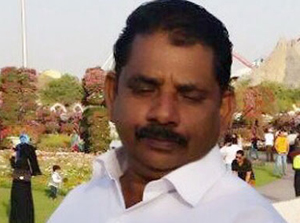Abu Dhabi, Jan 6: An Indian businessman who had been running cafeterias in the UAE for more than three decades was going home after saying good bye to his friends and relatives, but did not reach, as he died of a heart attack at the airport.
 Shahul Hameed, 58, had been living in the UAE for more than 35 years and just after calling it a day, he was all set to fly home from Abu Dhabi, boarding pass in hand.
Shahul Hameed, 58, had been living in the UAE for more than 35 years and just after calling it a day, he was all set to fly home from Abu Dhabi, boarding pass in hand.
Before he could board the plane, he developed chest pain and died at the airport itself. Shahul Hameed, who hails from Tirur Vailathoor in Kerala, used to run a cafeteria at Hilton Road, Al Ain.
“He said goodbye to his friends and relatives on Saturday and was waiting to board the flight to Calicut on Saturday evening when he suddenly developed chest pain and a strong heart attack.
“He was only a few hours away from his family, but died at the airport itself while waiting after collecting his boarding pass,” a friend of the deceased said.
The body was shifted to the Khalifa Hospital. The deceased is survived by his daughters Sajila, Shamseela and Shamjad.




Comments
Inna Lillahi Wa Inna Ilaihi Raajioon
??? ??? ? ??? ???? ???????
Very Tragedy
Most of Keraleans in the Gulf end-up returning home in Coffins. The lust for money is high among these people.
Add new comment